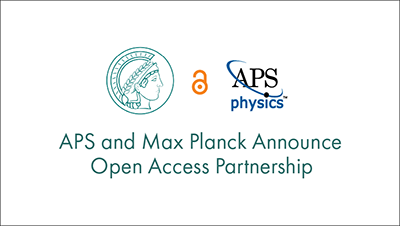American Physical Society, Max Planck Gesellschaft Pilot Transformative Agreement
Partnership provides seamless open access publishing to MPG-affiliated researchers
COLLEGE PARK, MD, and MUNICH, GERMANY, JULY 7, 2020 — The American Physical Society (APS) and the Max Planck Gesellschaft (MPG) have finalized the terms of a strategic partnership that allows MPG authors to easily publish open access in all hybrid and gold Physical Review journals at no direct cost to authors. At the center of the collaboration is APS’s first “read and publish” pilot, covering the calendar year 2020, and building upon the long-standing relationship between APS and the Max Planck Digital Library (MPDL).
“This expansion of our valued partnership with the Max Planck Society is aligned with our mission to advance scientific discovery and research dissemination, and it reflects our organizations’ shared commitment to open science,” said APS Chief Executive Officer, Dr. Kate Kirby
The collaboration initiated late last year, as APS and MPDL began working together on the development of new processes and systems required to support the pilot, and the resulting workflows have been fully functional since early 2020. Both organizations are committed to further collaboration on continuously improving this infrastructure to further support sustainable open access publishing. This will also allow APS to offer new open access publishing services more broadly, and thus continue to expand its role in supporting open science and the evolving needs of the broader scientific community.
Prof. Klaus Blaum, incoming Vice President of the Max Planck Society’s Scientific Council for Chemistry, Physics and Technology said, “The journals of APS are highly valued by our scientists and our peers globally, and this new agreement will enable the broadest possible readership for a significant portion of our peer-reviewed research, ultimately improving and accelerating the scientific process.”
“This new transformative agreement with APS marks an important development in our strategy to repurpose our subscription investments in order to deliver open access publishing opportunities to our authors while, at the same time, contributing to the broader transition of today’s scholarly journals to open access in line with objectives Open Access 2020 Initiative,” said Ralf Schimmer, Head of Information at the Max Planck Digital Library.
Both hybrid and fully open access peer-reviewed journals published by APS — including highly-selective flagship titles such as Physical Review Letters and Physical Review X — are covered under the read and publish pilot.
“The pilot is designed to deliver tremendous value to researchers by providing the opportunity to conveniently publish open access in the most-read and highest-cited peer-reviewed journals in physics and related disciplines, broadly trusted and valued by researchers around the world for more than 127 years,” said APS Publisher Dr. Matthew Salter.
To publish open access in these journals and make their articles immediately and freely available to readers without a subscription, authors are generally required to pay a fee. Under the new transformative agreement, the article publication charges (APCs) are covered by the institutional license fee, meaning that authors affiliated with any of 88 Max Planck institutes and research facilities can publish open access in the Physical Review journals without needing to spend time and resources on the invoicing and payment process. Upon publication their papers will be made immediately open access under a CC-BY license allowing broad access and reuse rights.
“The development of this partnership was motivated by our organizations’ mutual commitment to providing excellent service to our shared customers, the research communities,” said APS Associate Publisher Jeff Lewandowski. “By facilitating hassle-free open access publishing that allows MPG authors to maximize the visibility and impact of their research, and increasing the open access content available to users worldwide, together we are now serving those communities more effectively than ever before.”
The 2020 license also continues to provide MPG-affiliated readers access to the entire APS online library, including peer-reviewed research and review articles published from 1893 to the present. APS and MPG have also made significant progress towards developing a longer-term arrangement to extend this open access partnership beyond 2020 in a manner that is sustainable for both organizations and able to adapt to the evolving open science landscape.
The new partnership is the latest in a long series of innovations by APS in support of its goal to provide sustainable open access options for all researchers across the communities it serves. In the 1990s APS adopted policies supporting green open access through self-archiving, and also launched one of the first fully open access journals in physics. Since then it has continued to invest and innovate in open science through a number of initiatives, including: developing fully open access and hybrid journals to meet a diverse array of author needs; subsidizing open access publishing costs; supporting CHORUS as a founding member; and participating in the SCOAP3 initiative to facilitate convenient open access publishing for high-energy physics researchers.
About the Max Planck Gesellschaft
The Max Planck Society for the Advancement of Science (www.mpg.de/en) is an independent, non-profit research organization. Focusing on research fields that are particularly innovative, the 83 Max Planck Institutes conduct basic research in the service of the general public in the natural sciences, life sciences, social sciences, and the humanities. More than 15,000 studies by its researchers are published each year in internationally renowned scientific journals.

APS Press Releases
APS issues press releases on research news, Society activities, and other physics tips.
APS Media Contacts
General Media Inquiries
media@aps.org
David Barnstone
Head of Public Relations
barnstone@aps.org
(301) 209-3267
Using the APS Logo
About APS
The American Physical Society is a nonprofit membership organization working to advance and diffuse the knowledge of physics through its outstanding research journals, scientific meetings, and education, outreach, advocacy, and international activities. APS represents more than 50,000 members, including physicists in academia, national laboratories, and industry in the United States and throughout the world.
